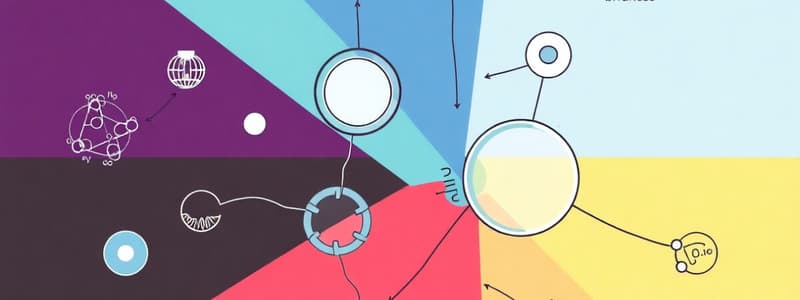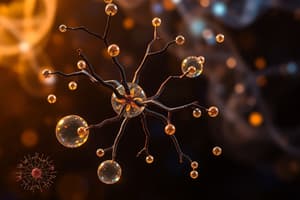Podcast
Questions and Answers
Which branch of science focuses on abstract concepts?
Which branch of science focuses on abstract concepts?
- Social Sciences
- Applied Sciences
- Natural Sciences
- Formal Sciences (correct)
What is the first step in the scientific method?
What is the first step in the scientific method?
- Hypothesis
- Observation (correct)
- Research
- Communication
Which of the following best describes a scientific theory?
Which of the following best describes a scientific theory?
- A well-substantiated explanation (correct)
- A simple guess
- An unchanging fact
- A testable explanation
What is the main goal of peer review in scientific research?
What is the main goal of peer review in scientific research?
Which of the following is NOT a subdivision of Natural Sciences?
Which of the following is NOT a subdivision of Natural Sciences?
Which of the following is considered an applied science?
Which of the following is considered an applied science?
In the context of ethical issues in science, which of the following is a primary concern?
In the context of ethical issues in science, which of the following is a primary concern?
What is the purpose of experimentation in the scientific method?
What is the purpose of experimentation in the scientific method?
Study Notes
Definition of Science
- Systematic enterprise that builds and organizes knowledge.
- Utilizes observation, experimentation, and reasoning.
Branches of Science
-
Natural Sciences
- Focus on the physical world and its phenomena.
- Subdivisions:
- Physics
- Chemistry
- Biology
- Earth Science
-
Formal Sciences
- Study of abstract concepts.
- Subdivisions:
- Mathematics
- Logic
- Statistics
- Computer Science
-
Social Sciences
- Examine human behavior and societies.
- Subdivisions:
- Psychology
- Sociology
- Anthropology
- Economics
-
Applied Sciences
- Practical application of scientific knowledge.
- Includes fields like engineering, medicine, and technology.
Scientific Method
- A systematic approach to inquiry.
- Observation: Identify a problem or phenomenon.
- Research: Gather background information.
- Hypothesis: Propose a testable explanation.
- Experimentation: Test the hypothesis through experiments.
- Analysis: Analyze data to draw conclusions.
- Conclusion: Accept or reject the hypothesis.
- Communication: Share findings with the scientific community.
Importance of Science
- Advances knowledge and understanding of the universe.
- Drives technological innovation.
- Informs public policy and healthcare decisions.
- Addresses global challenges (e.g., climate change, health crises).
Key Concepts in Science
- Theory: A well-substantiated explanation of an aspect of the natural world.
- Law: A statement that describes an observable occurrence in nature.
- Experiment: A controlled procedure to test hypotheses.
- Peer Review: Evaluation by experts in the field to ensure quality and validity of research.
Ethics in Science
- Importance of integrity, confidentiality, and respect.
- Issues like plagiarism, data fabrication, and human/animal rights in research.
Modern Developments
- Interdisciplinary studies (e.g., bioinformatics, environmental science).
- The role of technology and data analysis in research.
- The impact of science on society and ethical considerations.
Keywords
- Hypothesis, Theory, Experiment, Observation, Data Analysis, Peer Review, Ethics
Definition of Science
- Science is a systematic and organized way of gaining and organizing knowledge about the natural world through observation, experimentation, and logical reasoning.
Branches of Science
- Natural Sciences study the physical world and its phenomena, encompassing fields like physics, chemistry, biology, and earth sciences.
- Formal Sciences deal with abstract concepts like mathematics, logic, statistics, and computer science.
- Social Sciences focus on human behavior and societies, including psychology, sociology, anthropology, and economics.
- Applied Sciences utilize scientific knowledge for practical purposes, encompassing fields like engineering, medicine, and technology.
Scientific Method
- The scientific method is a structured approach to inquiry, consisting of:
- Observation: Identifying a problem or phenomenon that needs explanation.
- Research: Gathering existing information and knowledge related to the problem.
- Hypothesis: Formulating a testable explanation for the observed phenomenon.
- Experimentation: Designing and conducting experiments to test the hypothesis.
- Analysis: Examining and interpreting the data collected during experimentation.
- Conclusion: Drawing conclusions about the validity of the hypothesis based on the analysis.
- Communication: Sharing findings with the scientific community through publications, presentations, or other means.
Importance of Science
- Science plays a crucial role in advancing our understanding of the universe and its workings.
- It drives technological innovation, creating new tools, devices, and solutions to various problems.
- Science provides evidence-based knowledge, informing public policy decisions and healthcare interventions.
- Science helps address global challenges such as climate change and health crises by providing insights and solutions.
Key Concepts in Science
- Theory: A well-supported explanation of an aspect of the natural world, based on substantial evidence and numerous observations.
- Law: A statement describing a consistent pattern or relationship observed in nature, often expressed mathematically.
- Experiment: A controlled procedure designed to test a specific hypothesis under controlled conditions.
- Peer Review: A process where scientific work is evaluated by experts in the field to ensure quality, validity, and originality before publication.
Ethics in Science
- Ethical considerations are paramount in scientific research, emphasizing integrity, confidentiality, and respect for all involved.
- Scientific misconduct, including plagiarism, data fabrication, and unethical treatment of humans or animals in research, must be strictly avoided.
Modern Developments
- Interdisciplinary Studies: Combining knowledge and methods from multiple scientific fields, like bioinformatics (combining biology and computer science) or environmental science (integrating biology, chemistry, and earth sciences).
- Technology and Data Analysis: The increasing reliance on technology for data collection, analysis, and interpretation has led to the development of powerful tools and techniques in scientific research.
- Social Impact of Science: Scientific discoveries and advancements have profound implications for society, raising ethical challenges and influencing public policy and social norms.
Keywords
- Hypothesis, Theory, Experiment, Observation, Data Analysis, Peer Review, Ethics
Studying That Suits You
Use AI to generate personalized quizzes and flashcards to suit your learning preferences.
Description
This quiz covers the fundamental definition of science, its various branches, and key aspects of the scientific method. Explore the distinctions between natural, formal, social, and applied sciences to enhance your understanding of how we gather and organize knowledge.



